Effective Planning and Evaluation of a Mentoring Program Essay
VerifiedAdded on 2022/11/24
|9
|2665
|207
Essay
AI Summary
This essay provides a comprehensive analysis of planning and evaluating a mentoring program, using Marks and Spencer as a case study. It begins by outlining the process of effective planning, including setting goals, strategic thinking, business planning, implementation, and review. The essay then delves into methods for evaluating mentoring strategies, such as process adherence, pulse checks, and assessing the experiences of mentors and mentees, as well as organizational outcomes. Furthermore, the essay highlights the importance of mentoring programs from both individual and business perspectives, emphasizing increased confidence, higher self-awareness, positive company culture, and improved employee retention. The conclusion summarizes the key elements for implementing a successful mentoring program, stressing the benefits for both the mentee, the mentor, and the overall business.
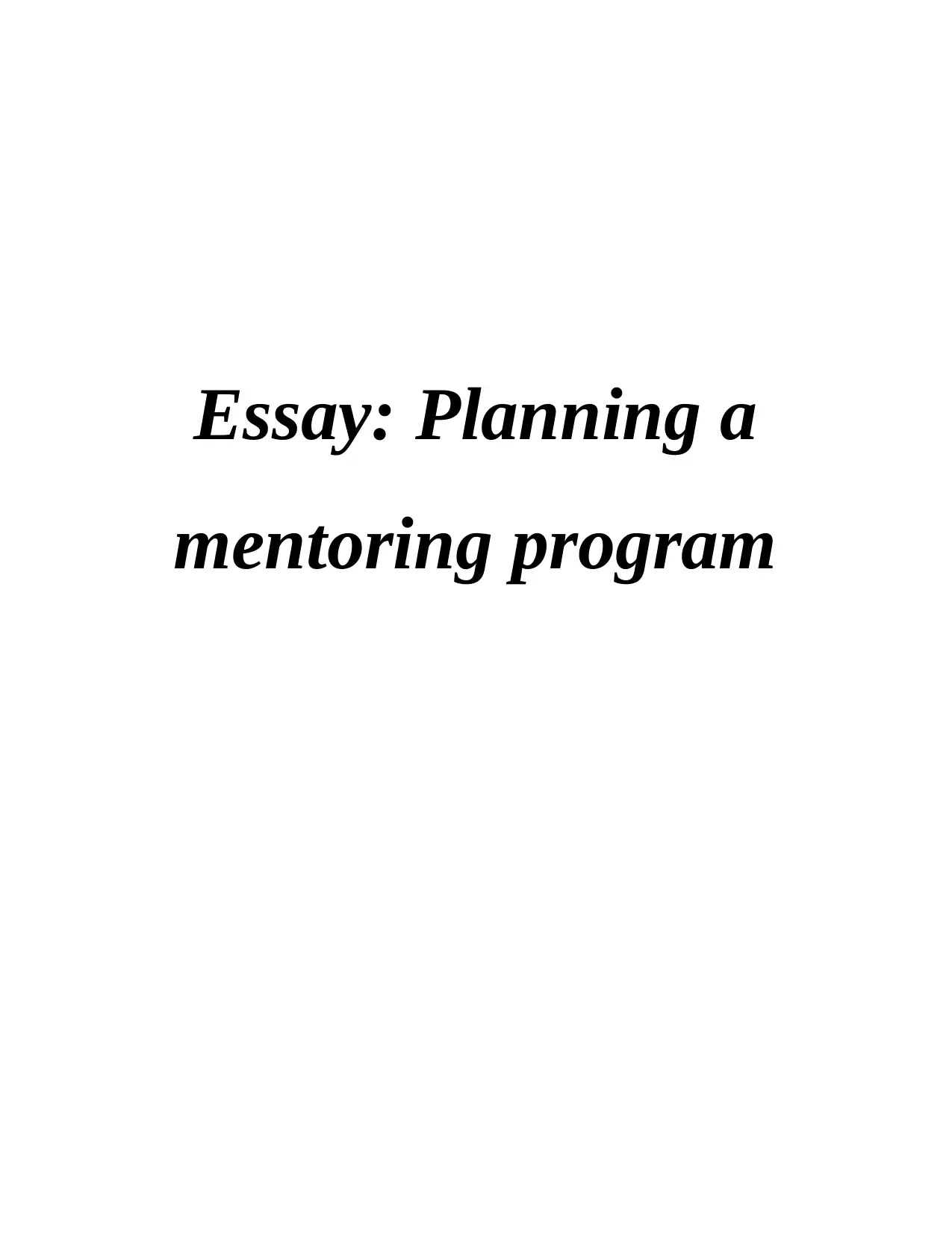
Essay: Planning a
mentoring program
mentoring program
Paraphrase This Document
Need a fresh take? Get an instant paraphrase of this document with our AI Paraphraser
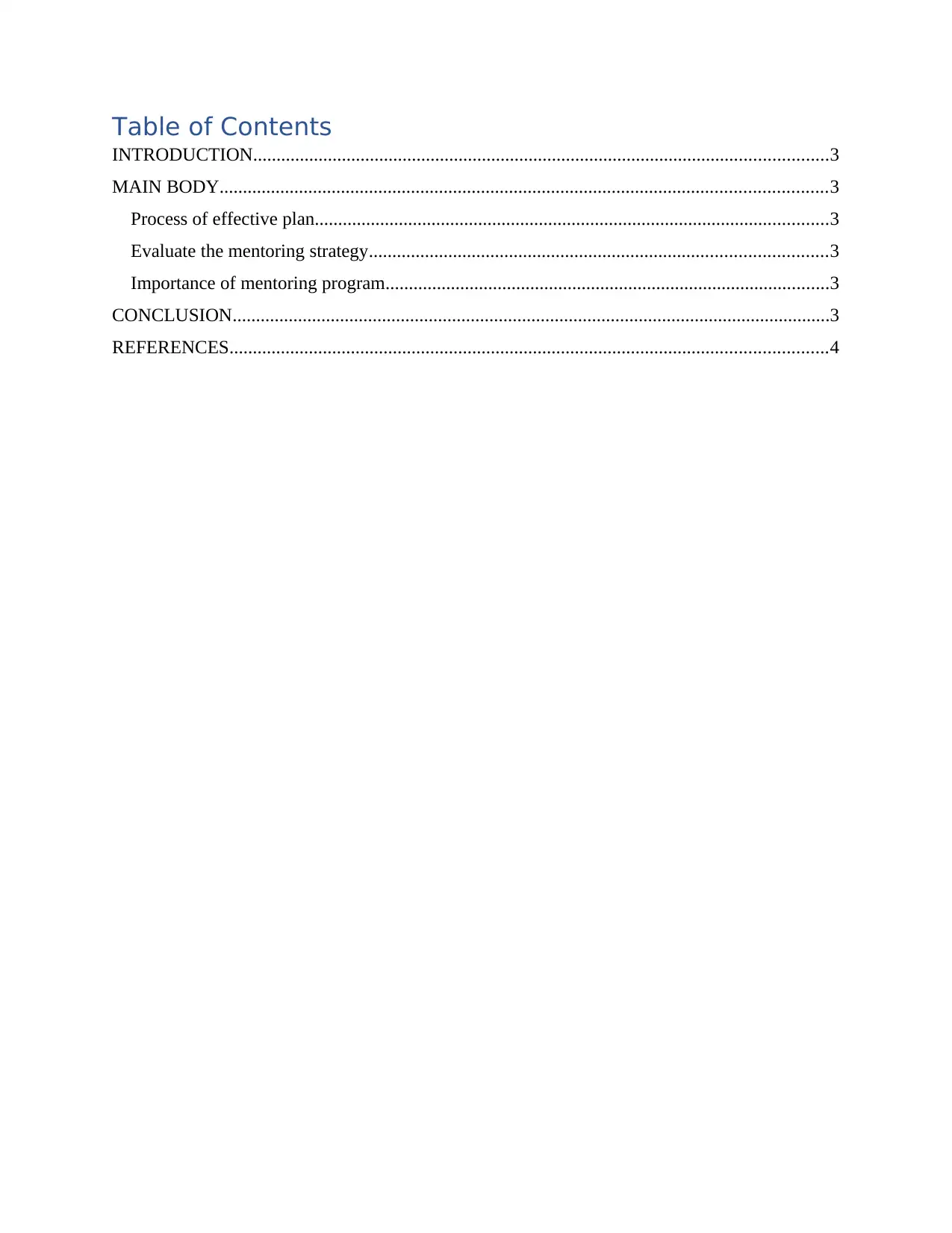
Table of Contents
INTRODUCTION...........................................................................................................................3
MAIN BODY..................................................................................................................................3
Process of effective plan..............................................................................................................3
Evaluate the mentoring strategy..................................................................................................3
Importance of mentoring program...............................................................................................3
CONCLUSION................................................................................................................................3
REFERENCES................................................................................................................................4
INTRODUCTION...........................................................................................................................3
MAIN BODY..................................................................................................................................3
Process of effective plan..............................................................................................................3
Evaluate the mentoring strategy..................................................................................................3
Importance of mentoring program...............................................................................................3
CONCLUSION................................................................................................................................3
REFERENCES................................................................................................................................4
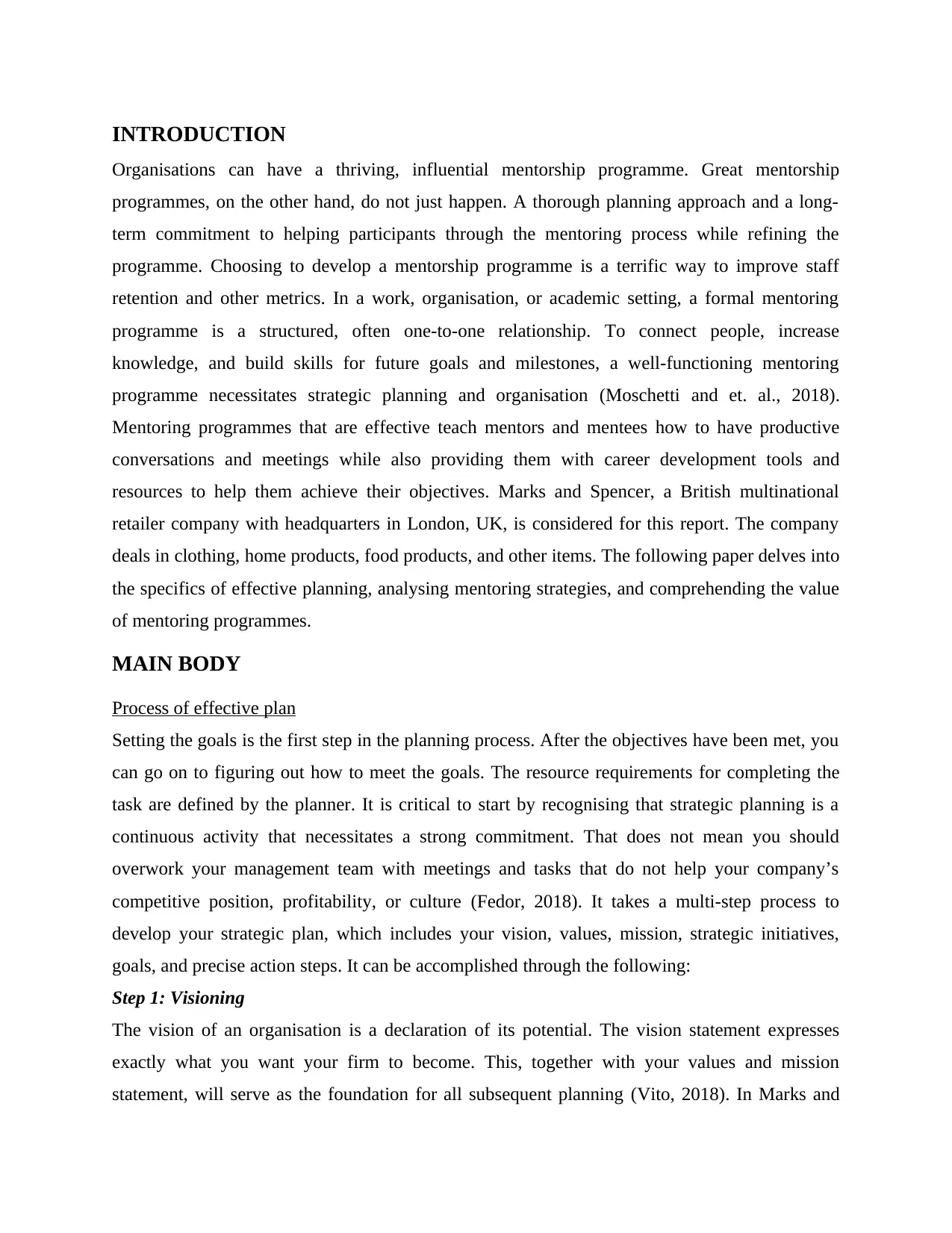
INTRODUCTION
Organisations can have a thriving, influential mentorship programme. Great mentorship
programmes, on the other hand, do not just happen. A thorough planning approach and a long-
term commitment to helping participants through the mentoring process while refining the
programme. Choosing to develop a mentorship programme is a terrific way to improve staff
retention and other metrics. In a work, organisation, or academic setting, a formal mentoring
programme is a structured, often one-to-one relationship. To connect people, increase
knowledge, and build skills for future goals and milestones, a well-functioning mentoring
programme necessitates strategic planning and organisation (Moschetti and et. al., 2018).
Mentoring programmes that are effective teach mentors and mentees how to have productive
conversations and meetings while also providing them with career development tools and
resources to help them achieve their objectives. Marks and Spencer, a British multinational
retailer company with headquarters in London, UK, is considered for this report. The company
deals in clothing, home products, food products, and other items. The following paper delves into
the specifics of effective planning, analysing mentoring strategies, and comprehending the value
of mentoring programmes.
MAIN BODY
Process of effective plan
Setting the goals is the first step in the planning process. After the objectives have been met, you
can go on to figuring out how to meet the goals. The resource requirements for completing the
task are defined by the planner. It is critical to start by recognising that strategic planning is a
continuous activity that necessitates a strong commitment. That does not mean you should
overwork your management team with meetings and tasks that do not help your company’s
competitive position, profitability, or culture (Fedor, 2018). It takes a multi-step process to
develop your strategic plan, which includes your vision, values, mission, strategic initiatives,
goals, and precise action steps. It can be accomplished through the following:
Step 1: Visioning
The vision of an organisation is a declaration of its potential. The vision statement expresses
exactly what you want your firm to become. This, together with your values and mission
statement, will serve as the foundation for all subsequent planning (Vito, 2018). In Marks and
Organisations can have a thriving, influential mentorship programme. Great mentorship
programmes, on the other hand, do not just happen. A thorough planning approach and a long-
term commitment to helping participants through the mentoring process while refining the
programme. Choosing to develop a mentorship programme is a terrific way to improve staff
retention and other metrics. In a work, organisation, or academic setting, a formal mentoring
programme is a structured, often one-to-one relationship. To connect people, increase
knowledge, and build skills for future goals and milestones, a well-functioning mentoring
programme necessitates strategic planning and organisation (Moschetti and et. al., 2018).
Mentoring programmes that are effective teach mentors and mentees how to have productive
conversations and meetings while also providing them with career development tools and
resources to help them achieve their objectives. Marks and Spencer, a British multinational
retailer company with headquarters in London, UK, is considered for this report. The company
deals in clothing, home products, food products, and other items. The following paper delves into
the specifics of effective planning, analysing mentoring strategies, and comprehending the value
of mentoring programmes.
MAIN BODY
Process of effective plan
Setting the goals is the first step in the planning process. After the objectives have been met, you
can go on to figuring out how to meet the goals. The resource requirements for completing the
task are defined by the planner. It is critical to start by recognising that strategic planning is a
continuous activity that necessitates a strong commitment. That does not mean you should
overwork your management team with meetings and tasks that do not help your company’s
competitive position, profitability, or culture (Fedor, 2018). It takes a multi-step process to
develop your strategic plan, which includes your vision, values, mission, strategic initiatives,
goals, and precise action steps. It can be accomplished through the following:
Step 1: Visioning
The vision of an organisation is a declaration of its potential. The vision statement expresses
exactly what you want your firm to become. This, together with your values and mission
statement, will serve as the foundation for all subsequent planning (Vito, 2018). In Marks and
⊘ This is a preview!⊘
Do you want full access?
Subscribe today to unlock all pages.

Trusted by 1+ million students worldwide
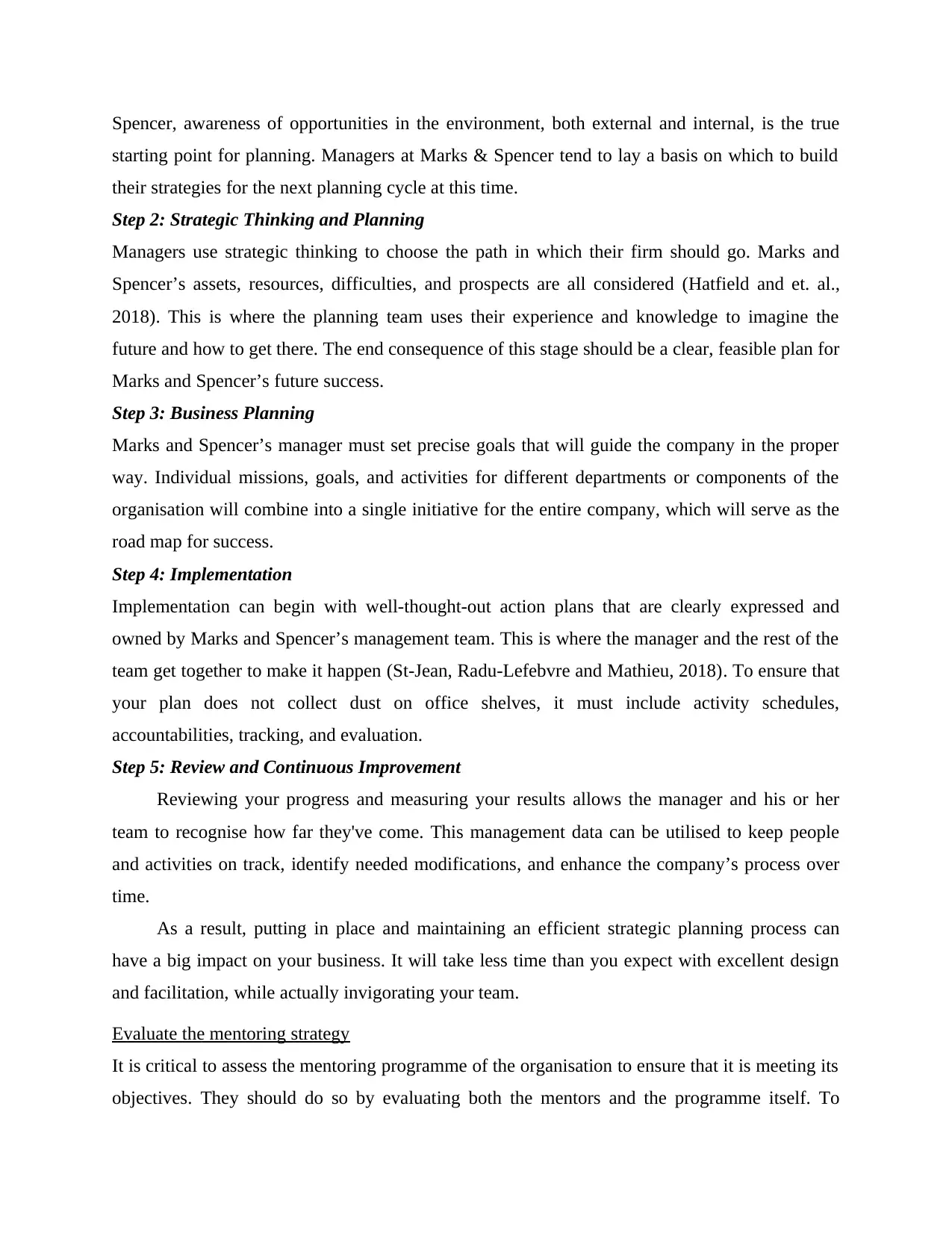
Spencer, awareness of opportunities in the environment, both external and internal, is the true
starting point for planning. Managers at Marks & Spencer tend to lay a basis on which to build
their strategies for the next planning cycle at this time.
Step 2: Strategic Thinking and Planning
Managers use strategic thinking to choose the path in which their firm should go. Marks and
Spencer’s assets, resources, difficulties, and prospects are all considered (Hatfield and et. al.,
2018). This is where the planning team uses their experience and knowledge to imagine the
future and how to get there. The end consequence of this stage should be a clear, feasible plan for
Marks and Spencer’s future success.
Step 3: Business Planning
Marks and Spencer’s manager must set precise goals that will guide the company in the proper
way. Individual missions, goals, and activities for different departments or components of the
organisation will combine into a single initiative for the entire company, which will serve as the
road map for success.
Step 4: Implementation
Implementation can begin with well-thought-out action plans that are clearly expressed and
owned by Marks and Spencer’s management team. This is where the manager and the rest of the
team get together to make it happen (St-Jean, Radu-Lefebvre and Mathieu, 2018). To ensure that
your plan does not collect dust on office shelves, it must include activity schedules,
accountabilities, tracking, and evaluation.
Step 5: Review and Continuous Improvement
Reviewing your progress and measuring your results allows the manager and his or her
team to recognise how far they've come. This management data can be utilised to keep people
and activities on track, identify needed modifications, and enhance the company’s process over
time.
As a result, putting in place and maintaining an efficient strategic planning process can
have a big impact on your business. It will take less time than you expect with excellent design
and facilitation, while actually invigorating your team.
Evaluate the mentoring strategy
It is critical to assess the mentoring programme of the organisation to ensure that it is meeting its
objectives. They should do so by evaluating both the mentors and the programme itself. To
starting point for planning. Managers at Marks & Spencer tend to lay a basis on which to build
their strategies for the next planning cycle at this time.
Step 2: Strategic Thinking and Planning
Managers use strategic thinking to choose the path in which their firm should go. Marks and
Spencer’s assets, resources, difficulties, and prospects are all considered (Hatfield and et. al.,
2018). This is where the planning team uses their experience and knowledge to imagine the
future and how to get there. The end consequence of this stage should be a clear, feasible plan for
Marks and Spencer’s future success.
Step 3: Business Planning
Marks and Spencer’s manager must set precise goals that will guide the company in the proper
way. Individual missions, goals, and activities for different departments or components of the
organisation will combine into a single initiative for the entire company, which will serve as the
road map for success.
Step 4: Implementation
Implementation can begin with well-thought-out action plans that are clearly expressed and
owned by Marks and Spencer’s management team. This is where the manager and the rest of the
team get together to make it happen (St-Jean, Radu-Lefebvre and Mathieu, 2018). To ensure that
your plan does not collect dust on office shelves, it must include activity schedules,
accountabilities, tracking, and evaluation.
Step 5: Review and Continuous Improvement
Reviewing your progress and measuring your results allows the manager and his or her
team to recognise how far they've come. This management data can be utilised to keep people
and activities on track, identify needed modifications, and enhance the company’s process over
time.
As a result, putting in place and maintaining an efficient strategic planning process can
have a big impact on your business. It will take less time than you expect with excellent design
and facilitation, while actually invigorating your team.
Evaluate the mentoring strategy
It is critical to assess the mentoring programme of the organisation to ensure that it is meeting its
objectives. They should do so by evaluating both the mentors and the programme itself. To
Paraphrase This Document
Need a fresh take? Get an instant paraphrase of this document with our AI Paraphraser
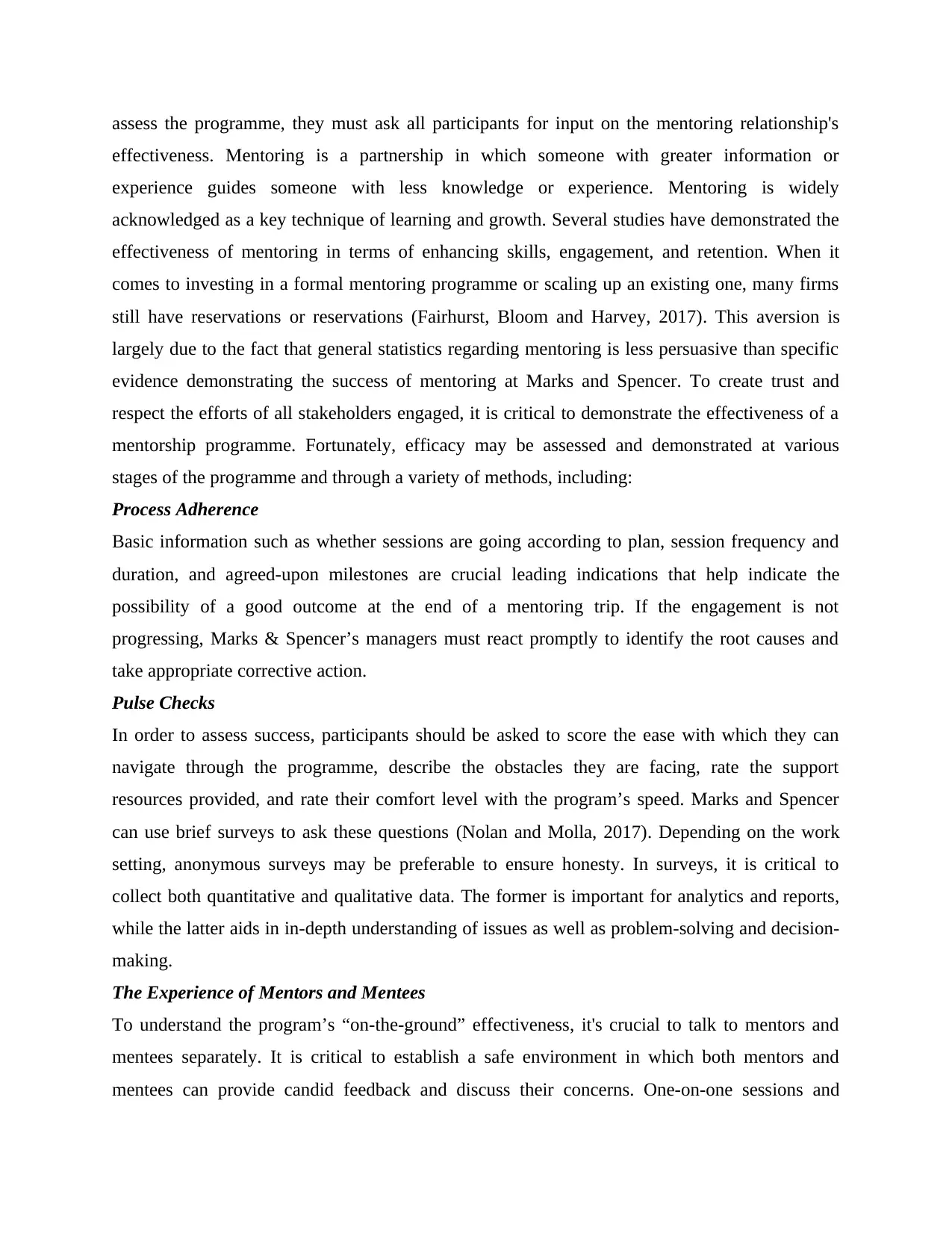
assess the programme, they must ask all participants for input on the mentoring relationship's
effectiveness. Mentoring is a partnership in which someone with greater information or
experience guides someone with less knowledge or experience. Mentoring is widely
acknowledged as a key technique of learning and growth. Several studies have demonstrated the
effectiveness of mentoring in terms of enhancing skills, engagement, and retention. When it
comes to investing in a formal mentoring programme or scaling up an existing one, many firms
still have reservations or reservations (Fairhurst, Bloom and Harvey, 2017). This aversion is
largely due to the fact that general statistics regarding mentoring is less persuasive than specific
evidence demonstrating the success of mentoring at Marks and Spencer. To create trust and
respect the efforts of all stakeholders engaged, it is critical to demonstrate the effectiveness of a
mentorship programme. Fortunately, efficacy may be assessed and demonstrated at various
stages of the programme and through a variety of methods, including:
Process Adherence
Basic information such as whether sessions are going according to plan, session frequency and
duration, and agreed-upon milestones are crucial leading indications that help indicate the
possibility of a good outcome at the end of a mentoring trip. If the engagement is not
progressing, Marks & Spencer’s managers must react promptly to identify the root causes and
take appropriate corrective action.
Pulse Checks
In order to assess success, participants should be asked to score the ease with which they can
navigate through the programme, describe the obstacles they are facing, rate the support
resources provided, and rate their comfort level with the program’s speed. Marks and Spencer
can use brief surveys to ask these questions (Nolan and Molla, 2017). Depending on the work
setting, anonymous surveys may be preferable to ensure honesty. In surveys, it is critical to
collect both quantitative and qualitative data. The former is important for analytics and reports,
while the latter aids in in-depth understanding of issues as well as problem-solving and decision-
making.
The Experience of Mentors and Mentees
To understand the program’s “on-the-ground” effectiveness, it's crucial to talk to mentors and
mentees separately. It is critical to establish a safe environment in which both mentors and
mentees can provide candid feedback and discuss their concerns. One-on-one sessions and
effectiveness. Mentoring is a partnership in which someone with greater information or
experience guides someone with less knowledge or experience. Mentoring is widely
acknowledged as a key technique of learning and growth. Several studies have demonstrated the
effectiveness of mentoring in terms of enhancing skills, engagement, and retention. When it
comes to investing in a formal mentoring programme or scaling up an existing one, many firms
still have reservations or reservations (Fairhurst, Bloom and Harvey, 2017). This aversion is
largely due to the fact that general statistics regarding mentoring is less persuasive than specific
evidence demonstrating the success of mentoring at Marks and Spencer. To create trust and
respect the efforts of all stakeholders engaged, it is critical to demonstrate the effectiveness of a
mentorship programme. Fortunately, efficacy may be assessed and demonstrated at various
stages of the programme and through a variety of methods, including:
Process Adherence
Basic information such as whether sessions are going according to plan, session frequency and
duration, and agreed-upon milestones are crucial leading indications that help indicate the
possibility of a good outcome at the end of a mentoring trip. If the engagement is not
progressing, Marks & Spencer’s managers must react promptly to identify the root causes and
take appropriate corrective action.
Pulse Checks
In order to assess success, participants should be asked to score the ease with which they can
navigate through the programme, describe the obstacles they are facing, rate the support
resources provided, and rate their comfort level with the program’s speed. Marks and Spencer
can use brief surveys to ask these questions (Nolan and Molla, 2017). Depending on the work
setting, anonymous surveys may be preferable to ensure honesty. In surveys, it is critical to
collect both quantitative and qualitative data. The former is important for analytics and reports,
while the latter aids in in-depth understanding of issues as well as problem-solving and decision-
making.
The Experience of Mentors and Mentees
To understand the program’s “on-the-ground” effectiveness, it's crucial to talk to mentors and
mentees separately. It is critical to establish a safe environment in which both mentors and
mentees can provide candid feedback and discuss their concerns. One-on-one sessions and
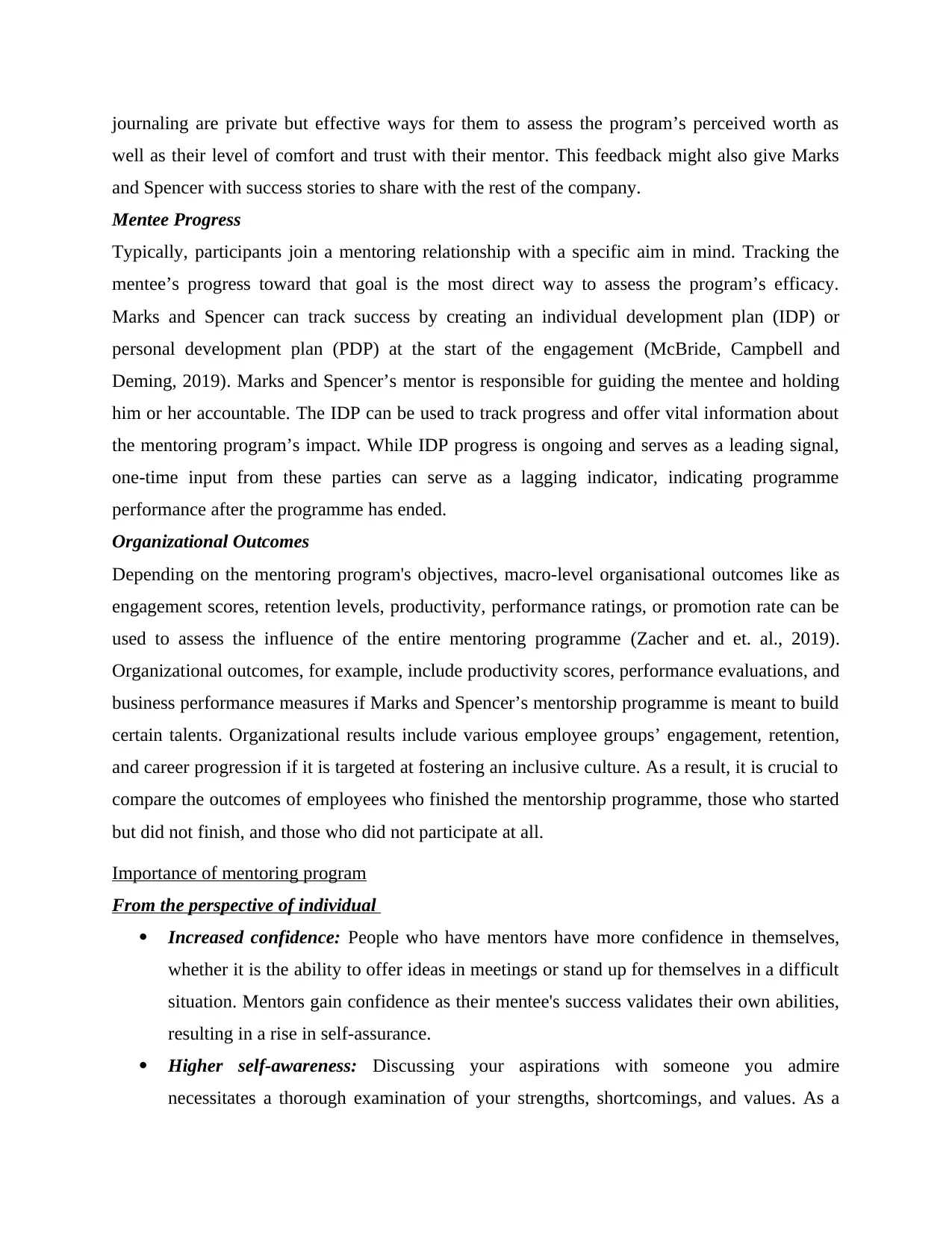
journaling are private but effective ways for them to assess the program’s perceived worth as
well as their level of comfort and trust with their mentor. This feedback might also give Marks
and Spencer with success stories to share with the rest of the company.
Mentee Progress
Typically, participants join a mentoring relationship with a specific aim in mind. Tracking the
mentee’s progress toward that goal is the most direct way to assess the program’s efficacy.
Marks and Spencer can track success by creating an individual development plan (IDP) or
personal development plan (PDP) at the start of the engagement (McBride, Campbell and
Deming, 2019). Marks and Spencer’s mentor is responsible for guiding the mentee and holding
him or her accountable. The IDP can be used to track progress and offer vital information about
the mentoring program’s impact. While IDP progress is ongoing and serves as a leading signal,
one-time input from these parties can serve as a lagging indicator, indicating programme
performance after the programme has ended.
Organizational Outcomes
Depending on the mentoring program's objectives, macro-level organisational outcomes like as
engagement scores, retention levels, productivity, performance ratings, or promotion rate can be
used to assess the influence of the entire mentoring programme (Zacher and et. al., 2019).
Organizational outcomes, for example, include productivity scores, performance evaluations, and
business performance measures if Marks and Spencer’s mentorship programme is meant to build
certain talents. Organizational results include various employee groups’ engagement, retention,
and career progression if it is targeted at fostering an inclusive culture. As a result, it is crucial to
compare the outcomes of employees who finished the mentorship programme, those who started
but did not finish, and those who did not participate at all.
Importance of mentoring program
From the perspective of individual
Increased confidence: People who have mentors have more confidence in themselves,
whether it is the ability to offer ideas in meetings or stand up for themselves in a difficult
situation. Mentors gain confidence as their mentee's success validates their own abilities,
resulting in a rise in self-assurance.
Higher self-awareness: Discussing your aspirations with someone you admire
necessitates a thorough examination of your strengths, shortcomings, and values. As a
well as their level of comfort and trust with their mentor. This feedback might also give Marks
and Spencer with success stories to share with the rest of the company.
Mentee Progress
Typically, participants join a mentoring relationship with a specific aim in mind. Tracking the
mentee’s progress toward that goal is the most direct way to assess the program’s efficacy.
Marks and Spencer can track success by creating an individual development plan (IDP) or
personal development plan (PDP) at the start of the engagement (McBride, Campbell and
Deming, 2019). Marks and Spencer’s mentor is responsible for guiding the mentee and holding
him or her accountable. The IDP can be used to track progress and offer vital information about
the mentoring program’s impact. While IDP progress is ongoing and serves as a leading signal,
one-time input from these parties can serve as a lagging indicator, indicating programme
performance after the programme has ended.
Organizational Outcomes
Depending on the mentoring program's objectives, macro-level organisational outcomes like as
engagement scores, retention levels, productivity, performance ratings, or promotion rate can be
used to assess the influence of the entire mentoring programme (Zacher and et. al., 2019).
Organizational outcomes, for example, include productivity scores, performance evaluations, and
business performance measures if Marks and Spencer’s mentorship programme is meant to build
certain talents. Organizational results include various employee groups’ engagement, retention,
and career progression if it is targeted at fostering an inclusive culture. As a result, it is crucial to
compare the outcomes of employees who finished the mentorship programme, those who started
but did not finish, and those who did not participate at all.
Importance of mentoring program
From the perspective of individual
Increased confidence: People who have mentors have more confidence in themselves,
whether it is the ability to offer ideas in meetings or stand up for themselves in a difficult
situation. Mentors gain confidence as their mentee's success validates their own abilities,
resulting in a rise in self-assurance.
Higher self-awareness: Discussing your aspirations with someone you admire
necessitates a thorough examination of your strengths, shortcomings, and values. As a
⊘ This is a preview!⊘
Do you want full access?
Subscribe today to unlock all pages.

Trusted by 1+ million students worldwide
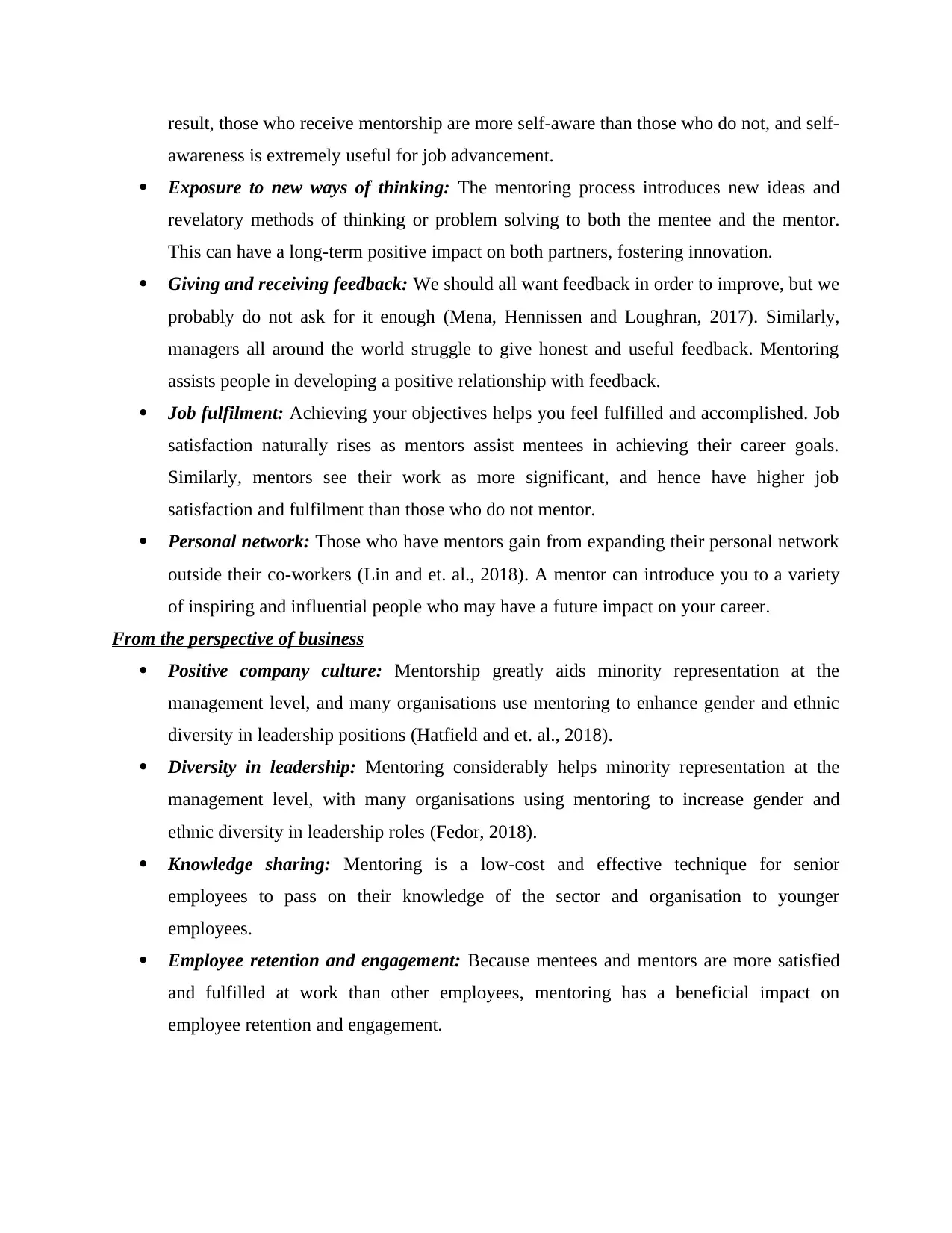
result, those who receive mentorship are more self-aware than those who do not, and self-
awareness is extremely useful for job advancement.
Exposure to new ways of thinking: The mentoring process introduces new ideas and
revelatory methods of thinking or problem solving to both the mentee and the mentor.
This can have a long-term positive impact on both partners, fostering innovation.
Giving and receiving feedback: We should all want feedback in order to improve, but we
probably do not ask for it enough (Mena, Hennissen and Loughran, 2017). Similarly,
managers all around the world struggle to give honest and useful feedback. Mentoring
assists people in developing a positive relationship with feedback.
Job fulfilment: Achieving your objectives helps you feel fulfilled and accomplished. Job
satisfaction naturally rises as mentors assist mentees in achieving their career goals.
Similarly, mentors see their work as more significant, and hence have higher job
satisfaction and fulfilment than those who do not mentor.
Personal network: Those who have mentors gain from expanding their personal network
outside their co-workers (Lin and et. al., 2018). A mentor can introduce you to a variety
of inspiring and influential people who may have a future impact on your career.
From the perspective of business
Positive company culture: Mentorship greatly aids minority representation at the
management level, and many organisations use mentoring to enhance gender and ethnic
diversity in leadership positions (Hatfield and et. al., 2018).
Diversity in leadership: Mentoring considerably helps minority representation at the
management level, with many organisations using mentoring to increase gender and
ethnic diversity in leadership roles (Fedor, 2018).
Knowledge sharing: Mentoring is a low-cost and effective technique for senior
employees to pass on their knowledge of the sector and organisation to younger
employees.
Employee retention and engagement: Because mentees and mentors are more satisfied
and fulfilled at work than other employees, mentoring has a beneficial impact on
employee retention and engagement.
awareness is extremely useful for job advancement.
Exposure to new ways of thinking: The mentoring process introduces new ideas and
revelatory methods of thinking or problem solving to both the mentee and the mentor.
This can have a long-term positive impact on both partners, fostering innovation.
Giving and receiving feedback: We should all want feedback in order to improve, but we
probably do not ask for it enough (Mena, Hennissen and Loughran, 2017). Similarly,
managers all around the world struggle to give honest and useful feedback. Mentoring
assists people in developing a positive relationship with feedback.
Job fulfilment: Achieving your objectives helps you feel fulfilled and accomplished. Job
satisfaction naturally rises as mentors assist mentees in achieving their career goals.
Similarly, mentors see their work as more significant, and hence have higher job
satisfaction and fulfilment than those who do not mentor.
Personal network: Those who have mentors gain from expanding their personal network
outside their co-workers (Lin and et. al., 2018). A mentor can introduce you to a variety
of inspiring and influential people who may have a future impact on your career.
From the perspective of business
Positive company culture: Mentorship greatly aids minority representation at the
management level, and many organisations use mentoring to enhance gender and ethnic
diversity in leadership positions (Hatfield and et. al., 2018).
Diversity in leadership: Mentoring considerably helps minority representation at the
management level, with many organisations using mentoring to increase gender and
ethnic diversity in leadership roles (Fedor, 2018).
Knowledge sharing: Mentoring is a low-cost and effective technique for senior
employees to pass on their knowledge of the sector and organisation to younger
employees.
Employee retention and engagement: Because mentees and mentors are more satisfied
and fulfilled at work than other employees, mentoring has a beneficial impact on
employee retention and engagement.
Paraphrase This Document
Need a fresh take? Get an instant paraphrase of this document with our AI Paraphraser
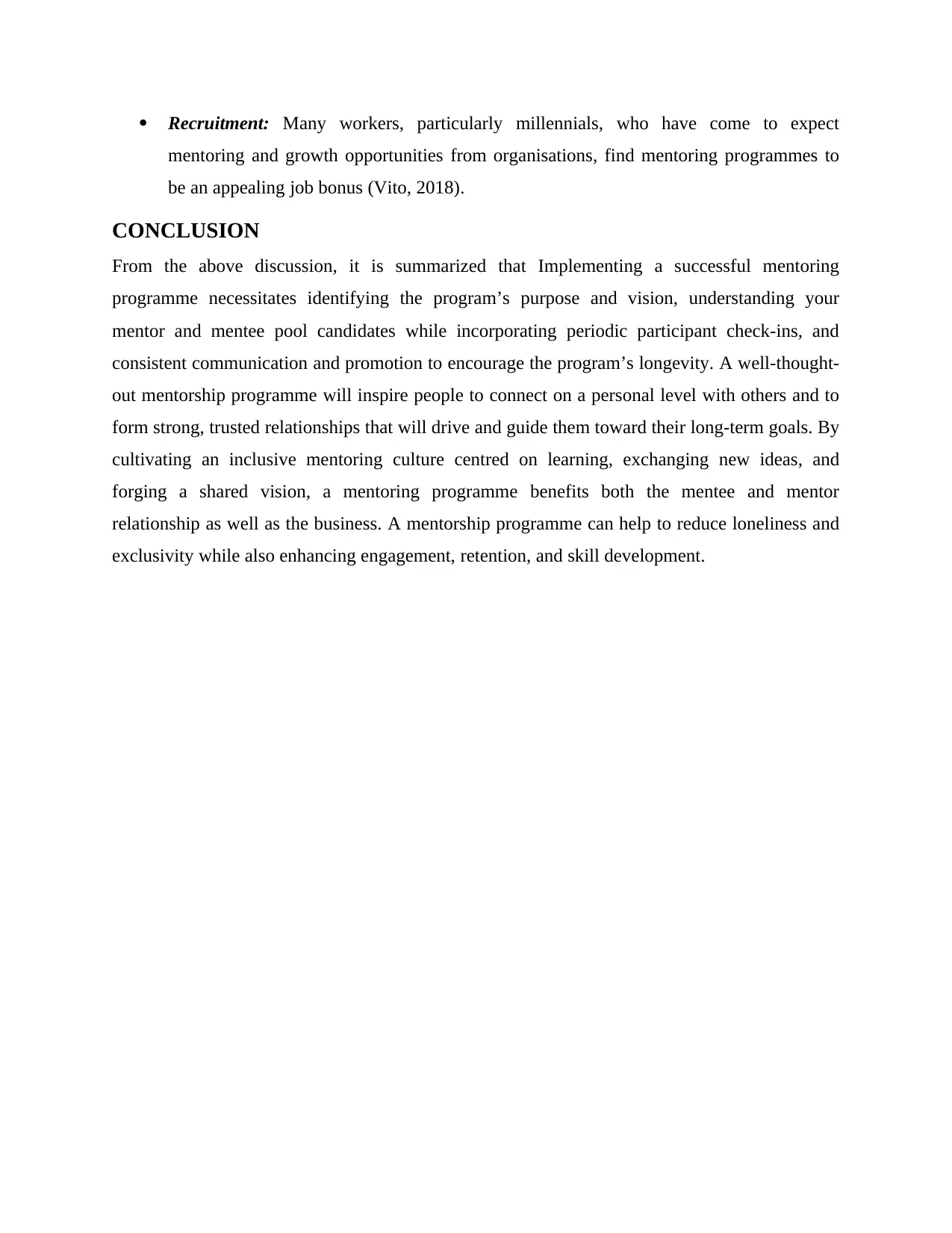
Recruitment: Many workers, particularly millennials, who have come to expect
mentoring and growth opportunities from organisations, find mentoring programmes to
be an appealing job bonus (Vito, 2018).
CONCLUSION
From the above discussion, it is summarized that Implementing a successful mentoring
programme necessitates identifying the program’s purpose and vision, understanding your
mentor and mentee pool candidates while incorporating periodic participant check-ins, and
consistent communication and promotion to encourage the program’s longevity. A well-thought-
out mentorship programme will inspire people to connect on a personal level with others and to
form strong, trusted relationships that will drive and guide them toward their long-term goals. By
cultivating an inclusive mentoring culture centred on learning, exchanging new ideas, and
forging a shared vision, a mentoring programme benefits both the mentee and mentor
relationship as well as the business. A mentorship programme can help to reduce loneliness and
exclusivity while also enhancing engagement, retention, and skill development.
mentoring and growth opportunities from organisations, find mentoring programmes to
be an appealing job bonus (Vito, 2018).
CONCLUSION
From the above discussion, it is summarized that Implementing a successful mentoring
programme necessitates identifying the program’s purpose and vision, understanding your
mentor and mentee pool candidates while incorporating periodic participant check-ins, and
consistent communication and promotion to encourage the program’s longevity. A well-thought-
out mentorship programme will inspire people to connect on a personal level with others and to
form strong, trusted relationships that will drive and guide them toward their long-term goals. By
cultivating an inclusive mentoring culture centred on learning, exchanging new ideas, and
forging a shared vision, a mentoring programme benefits both the mentee and mentor
relationship as well as the business. A mentorship programme can help to reduce loneliness and
exclusivity while also enhancing engagement, retention, and skill development.
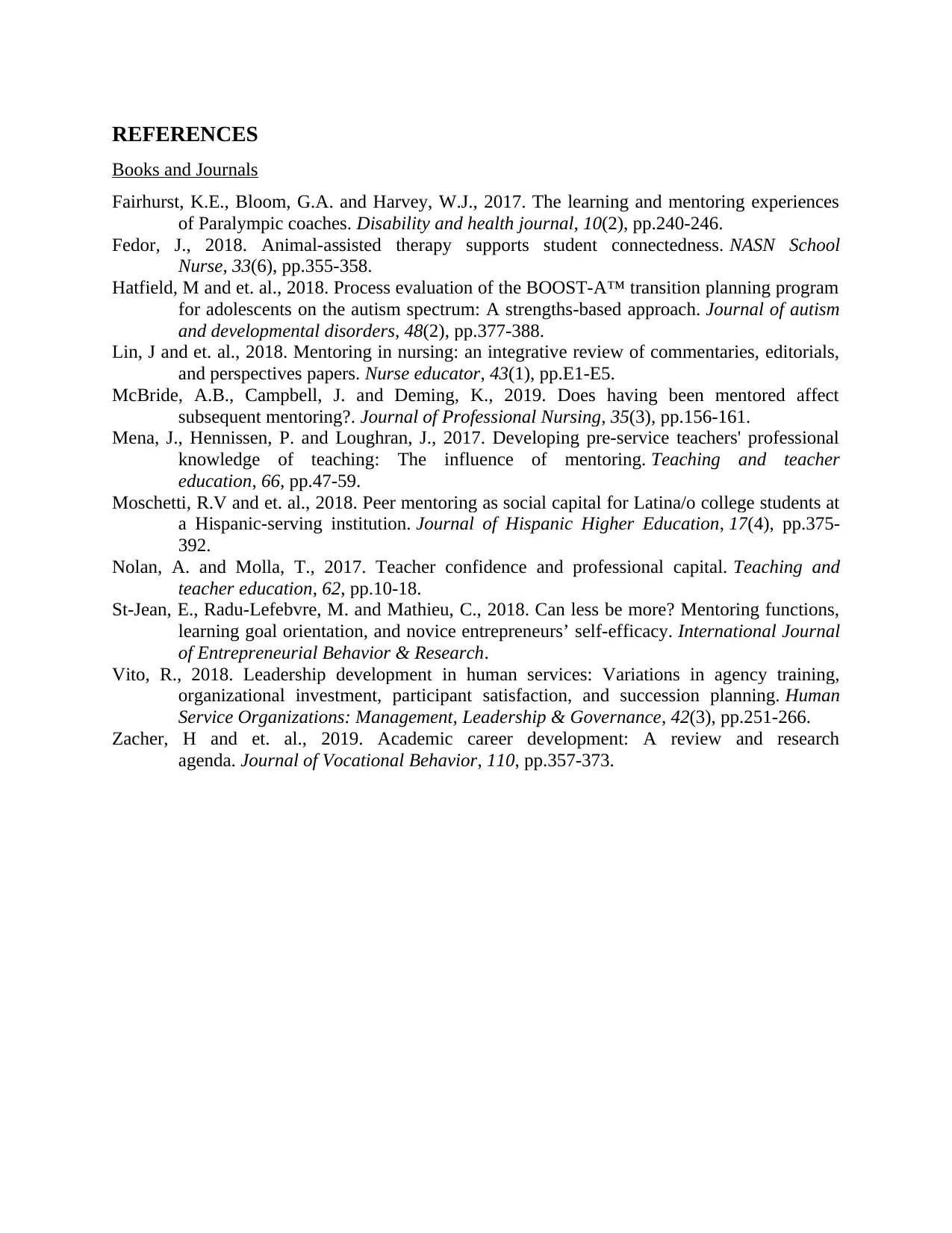
REFERENCES
Books and Journals
Fairhurst, K.E., Bloom, G.A. and Harvey, W.J., 2017. The learning and mentoring experiences
of Paralympic coaches. Disability and health journal, 10(2), pp.240-246.
Fedor, J., 2018. Animal-assisted therapy supports student connectedness. NASN School
Nurse, 33(6), pp.355-358.
Hatfield, M and et. al., 2018. Process evaluation of the BOOST-A™ transition planning program
for adolescents on the autism spectrum: A strengths-based approach. Journal of autism
and developmental disorders, 48(2), pp.377-388.
Lin, J and et. al., 2018. Mentoring in nursing: an integrative review of commentaries, editorials,
and perspectives papers. Nurse educator, 43(1), pp.E1-E5.
McBride, A.B., Campbell, J. and Deming, K., 2019. Does having been mentored affect
subsequent mentoring?. Journal of Professional Nursing, 35(3), pp.156-161.
Mena, J., Hennissen, P. and Loughran, J., 2017. Developing pre-service teachers' professional
knowledge of teaching: The influence of mentoring. Teaching and teacher
education, 66, pp.47-59.
Moschetti, R.V and et. al., 2018. Peer mentoring as social capital for Latina/o college students at
a Hispanic-serving institution. Journal of Hispanic Higher Education, 17(4), pp.375-
392.
Nolan, A. and Molla, T., 2017. Teacher confidence and professional capital. Teaching and
teacher education, 62, pp.10-18.
St-Jean, E., Radu-Lefebvre, M. and Mathieu, C., 2018. Can less be more? Mentoring functions,
learning goal orientation, and novice entrepreneurs’ self-efficacy. International Journal
of Entrepreneurial Behavior & Research.
Vito, R., 2018. Leadership development in human services: Variations in agency training,
organizational investment, participant satisfaction, and succession planning. Human
Service Organizations: Management, Leadership & Governance, 42(3), pp.251-266.
Zacher, H and et. al., 2019. Academic career development: A review and research
agenda. Journal of Vocational Behavior, 110, pp.357-373.
Books and Journals
Fairhurst, K.E., Bloom, G.A. and Harvey, W.J., 2017. The learning and mentoring experiences
of Paralympic coaches. Disability and health journal, 10(2), pp.240-246.
Fedor, J., 2018. Animal-assisted therapy supports student connectedness. NASN School
Nurse, 33(6), pp.355-358.
Hatfield, M and et. al., 2018. Process evaluation of the BOOST-A™ transition planning program
for adolescents on the autism spectrum: A strengths-based approach. Journal of autism
and developmental disorders, 48(2), pp.377-388.
Lin, J and et. al., 2018. Mentoring in nursing: an integrative review of commentaries, editorials,
and perspectives papers. Nurse educator, 43(1), pp.E1-E5.
McBride, A.B., Campbell, J. and Deming, K., 2019. Does having been mentored affect
subsequent mentoring?. Journal of Professional Nursing, 35(3), pp.156-161.
Mena, J., Hennissen, P. and Loughran, J., 2017. Developing pre-service teachers' professional
knowledge of teaching: The influence of mentoring. Teaching and teacher
education, 66, pp.47-59.
Moschetti, R.V and et. al., 2018. Peer mentoring as social capital for Latina/o college students at
a Hispanic-serving institution. Journal of Hispanic Higher Education, 17(4), pp.375-
392.
Nolan, A. and Molla, T., 2017. Teacher confidence and professional capital. Teaching and
teacher education, 62, pp.10-18.
St-Jean, E., Radu-Lefebvre, M. and Mathieu, C., 2018. Can less be more? Mentoring functions,
learning goal orientation, and novice entrepreneurs’ self-efficacy. International Journal
of Entrepreneurial Behavior & Research.
Vito, R., 2018. Leadership development in human services: Variations in agency training,
organizational investment, participant satisfaction, and succession planning. Human
Service Organizations: Management, Leadership & Governance, 42(3), pp.251-266.
Zacher, H and et. al., 2019. Academic career development: A review and research
agenda. Journal of Vocational Behavior, 110, pp.357-373.
⊘ This is a preview!⊘
Do you want full access?
Subscribe today to unlock all pages.

Trusted by 1+ million students worldwide
1 out of 9
Related Documents
Your All-in-One AI-Powered Toolkit for Academic Success.
+13062052269
info@desklib.com
Available 24*7 on WhatsApp / Email
![[object Object]](/_next/static/media/star-bottom.7253800d.svg)
Unlock your academic potential
Copyright © 2020–2026 A2Z Services. All Rights Reserved. Developed and managed by ZUCOL.





